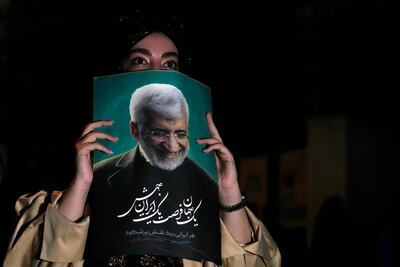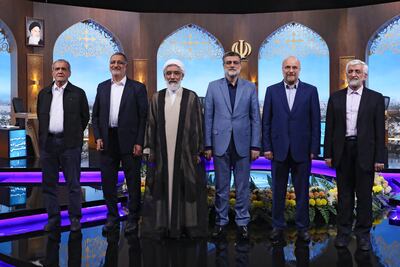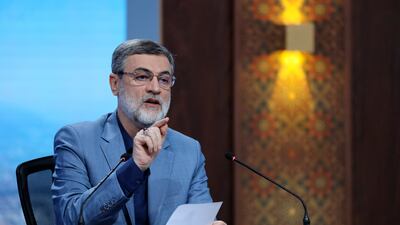Two hardline candidates in Iran's presidential election withdrew from the race on Thursday, a day before the vote, and called for unity among those supporting the country's Islamic revolution, state media reported.
Amirhossein Ghazizadeh Hashemi, 53, dropped his candidacy and urged other candidates to do the same “so that the front of the revolution will be strengthened”, Irna news agency reported.
Mr Ghazizadeh Hashemi served as one of the late president Ebrahim Raisi’s vice presidents and as the head of the Foundation of Martyrs and Veterans Affairs. He ran in the 2021 presidential election and finished last, with under one million votes.
Tehran's mayor Alireza Zakani, 58, also withdrew and urged the two leading hardline candidates, former nuclear negotiator Saeed Jalili and Parliament Speaker Mohammad Baqer Qalibaf, to “unite and not leave the demands of the revolutionary forces unanswered”.
Mr Ghazizadeh Hashemi and Mr Zakani were expected to win 1.7 per cent and 2 per cent of votes, according to a June 22-23 poll carried out by the Iran Students Polling Centre.
Late withdrawals are common in Iranian presidential elections, particularly the day before the vote when campaigns enter a mandatory period without rallies.
Analysts broadly see the election as a three-way contest between Mr Jalili, Mr Qalibaf and the sole reformist candidate, Masoud Pezeshkian, a cardiac surgeon who has associated himself with the former administration of the relatively moderate president Hassan Rouhani, who reached Iran's 2015 nuclear deal with world powers.
The other hardliner still in the race is Mostafa Pourmohammadi, who served as justice minister under Mr Rouhani.

Mr Rouhani on Wednesday threw his weight behind Mr Pezeshkian.
“On Friday, we should vote for someone who is determined to remove the shadow of sanctions from the Iranian people,” Mr Rouhani said in a video message published by the Shargh, praising Mr Pezeshkian's “honesty” and “loyalty”.
Iran’s theocracy under supreme leader Ayatollah Ali Khamenei has maintained its stance of not allowing women or anyone calling for radical change to the country’s government to stand for election. Mr Khamenei has called for a “maximum” turnout in the vote while issuing a warning to Mr Pezeshkian and his allies about relying on the US.
Widespread public apathy has descended in the Iranian capital over the election after the May 19 helicopter crash that killed Mr Raisi.
About a decade after the nuclear deal raised hopes of opening up Iran to the rest of the world, Iranians broadly face crushing economic conditions and an escalation in regional tensions that already has seen the Islamic Republic directly attack Israel for the first time. Iran also now enriches uranium to nearly weapons-grade levels and has enough of it to produce several nuclear weapons if it chooses.
The limited choice of candidates, who must be approved by Iran's Guardian Council, as well as widespread discontent over a continuing crackdown on women over the mandatory headscarf, has led to some Iranians saying they will not vote.

“I did not watch any of the debates since I have no plan to vote,” Fatemeh Jazayeri, a 27-year-old unemployed woman with a master’s degree, told the Associated Press.
“I voted for Rouhani seven years ago, but he failed to deliver his promises for a better economy. Any promise by any candidates will remain on paper only.”
Worshippers attending Friday prayers in Tehran last week, typically more conservative than others in the city, appeared more willing to vote.
Mahmoud Seyedi, a 46-year-old shopkeeper, said that he, his wife and their two daughters would all vote.
“My wife and I have decided to vote for Qalibaf since he knows how to solve problems of the country because of years of experience but my daughters are thinking about Jalili, too,” he said.
“Voting is a duty for us.”

